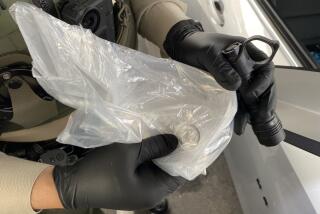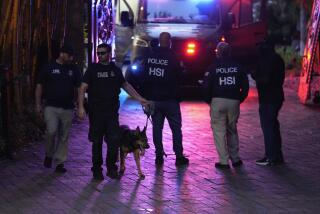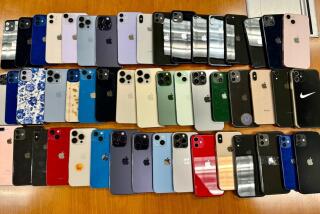IPhone raid search warrant unsealed
- Share via
LOS ANGELES AND SAN MATEO, CALIF. — Apple Inc. persuaded a Silicon Valley law enforcement task force to investigate the loss of a secret iPhone prototype, claiming that the phone was “invaluable” and that revelations of its features were “immensely damaging” to the company, according to documents unsealed Friday.
The investigation led to a controversial April 23 raid on the home of a technology blogger who published photos of the phone.
The search warrant for the raid, unsealed Friday by a San Mateo court, sheds more light on a case that has raised questions about the close ties between the industry and the little-known task force that was created to fight crimes against technology companies.
The documents also underscored how valuable the phone is to Apple, which has sold more than 50 million iPhone units since 2007. The documents revealed that Apple Chief Executive Steve Jobs personally asked Gizmodo.com to return the wayward phone.
According to the documents, unsealed at the request of The Times and other media outlets, the investigation by the Rapid Enforcement Allied Computer Team, or REACT, was triggered in part by Apple’s allegations that the phone prototype may have been stolen.
In a meeting just days before the raid, Apple executives and lawyers told a REACT investigator that publishing information about the device could harm sales of the current iPhone because potential buyers would wait for the new one to be released. An Apple executive could not give an estimate of the financial impact but said it would be “huge.”
According to the documents, Apple called police after being tipped off by the roommate of a Redwood City, Calif., man who had allegedly found the phone in a pub, where an Apple employee had lost it.
Jason Chen’s blog, Gizmodo, said it paid $5,000 for the prototype before Chen posted a lengthy story about it, including photos and videos. To provide details of its internal workings, Chen disassembled and damaged the phone, according to Apple officials cited in the documents.
But days before Chen’s home was raided, a San Mateo sheriff’s deputy was tracking down 21-year-old Brian Hogan, who authorities believe had found the phone and shopped it around to technology publications in an attempt to spark a bidding war.
But Hogan’s alleged scheme to profit from the sale of the lost phone unraveled when his roommate -- who, according to the documents, was there when Hogan realized that the phone could be a valuable prototype -- worried about being implicated in the case.
According to the affidavit, she contacted Apple security personnel, who then called the task force.
The roommate said she and a friend attempted to dissuade Hogan from selling the phone, noting how it might harm the career of the Apple employee who lost it. According to the roommate’s account, Hogan said: “Sucks for him. He lost his phone. Shouldn’t have lost his phone.”
Hogan has not been charged with any crime.
Hogan “thought he was sharing something he found with an editor of a website, and that they were going to review the phone and return it,” said his lawyer, Jeffrey L. Bornstein. “It was always his intention to make sure the phone was returned.”
Investigators had argued that a search of Chen’s home could uncover evidence outlining Hogan’s involvement in the case.
But the warrant makes no explicit mention of Chen’s being a journalist -- a status that, his lawyers argue, affords him protection under state and federal shield laws.
Seeking to get the search warrant on Chen’s home unsealed, attorneys for the media coalition that includes The Times have raised the question of whether the raid violated those laws, which limit the power to issue warrants for reporters’ notes and equipment.
During Friday’s hearing, San Mateo County Judge Clifford Cretan said he was aware of Chen’s status and had initially sealed the warrant to protect Chen’s work as a journalist.
The criminal inquiry has been stalled while prosecutors try to reach an agreement with Chen’s attorney Thomas Nolan about the extent to which they will search the seized computers. Chief Deputy Dist. Atty. Steve Wagstaffe defended the search last week, saying his office had reviewed the search and determined that it was proper.
But Thomas W. Newton, the general counsel of the California Newspaper Publishers Assn., said the warrant on Chen’s home still appeared to violate the shield laws.
jessica.guynn@latimes.com






